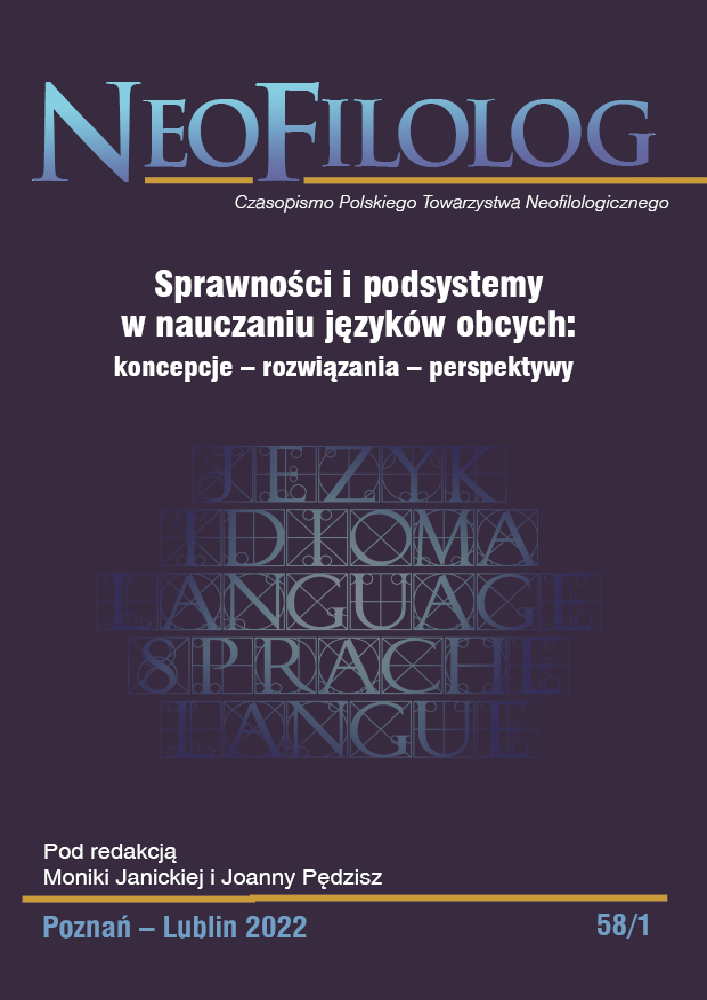Abstract
The article presents the result of our own research conducted among foreign language teachers. The aim of the study was to diagnose the extent to which the surveyed teachers implement the assumptions of multilingualism didactics, the focus of which is the ability to make positive inter-language transfer. Making such a transfer requires the student to develop - with the support of the teacher - a range of strategies based on the resources of their own linguistic repertoire, which is not possible without the ability to manage their own learning process and the emotions that accompany it, and to adopt a reflective attitude based on their previously acquired foreign language learning experience.
References
Arabski J. (2007), Transfer międzyjęzykowy, (w:) Kurcz I. (red.), Psychologiczne aspekty dwujęzyczności. Gdańsk: Gdańskie Wydawnictwo Psychologiczne, s. 341–351.
de Angelis G. (2005), Interlanguage Transfer of Function Words. „Language Learning”, nr 55, s. 379–414.
Europejski system opisu kształcenia językowego (2003). Warszawa: Centralny Ośrodek Doskonalenia Nauczycieli.
Hamers J.F., Blanc M.H.A. (2003), Bilinguality and Bilingualis. Cambridge: Cambridge University Press.
Heidrick I. (2006), Beyond the L2: How Is Transfer Affected by Multilingualism?. “Teaching College, Columbia University Working Papers in TESOL & Applied Linguistics”, vol. 6, nr 1, s. 1–3, http://www.tc.columbia.edu/aca-demic/tesol/WJFiles/pdf/Heidrick.pdf [DW 12.02.2017]
Jaroszewska A. (2014), O glottodydaktyce słowami glottodydaktyków. „Języki Obce w Szkole”, nr 4, s. 52–66.
Kopaczyńska I. (2008), Refleksyjność w procesie uczenia się (w:) Filipiak E. (red.), Rozwijanie zdolności uczenia się. Wybrane konteksty i problemy. Bydgoszcz: Wydawnictwo Uniwersytetu Kazimierza Wielkiego, s. 91–107.
Kucharczyk R. (2016), Kontekst nauczania języków obcych w Polsce – glottodydaktyczne implikacje dla drugich języków obcych. „Linguodidactica”, nr XX, s. 195–212.
Kucharczyk R. (2018), Nauczanie języków obcych a dydaktyka wielojęzyczności (na przykładzie francuskiego jako drugiego języka obcego). Lublin: Werset.
Kucharczyk R., Szymankiewicz K. (2016), Teorie osobiste dotyczące rozwijania kompetencji różnojęzycznej na lekcjach języka obcego – przypadek przyszłych nauczycieli języka francuskiego. „Języki Obce w Szkole”, nr 4, s. 64–70.
Le Cadre de référence pour les approches plurielles des langues et des cultures. (2012). Strasbourg: Conseil de l’Europe.
Lüdi G. (2016), Du plurilinguisme comme tare au plurilinguisme comme atout. L’héritage de l’idéologie monolingue, (w:) Komur-Thilloy G, Paprocka-Piotrowska U. (red.), L’éducation plurilingue. Contextes, représentations, pratiques. Paris: Orizons, s. 31–53.
Moore D., Castellotti, V. (2008), La notion de la compétence plurilingue et pluriculturelle: perspectives de la recherche francophone, (w:) Moore, D., Castellotti, V. (red.), La compétence plurilingue: regards francophones. Peter Lang: Bern, Berlin, Bruxelles, Frankfurt am Main, New York, Oxford, Wien, s. 11–24.
Perkowska-Klejman A. (2013), Modele refleksyjnego uczenia się. „Teraźniejszość – Człowiek – Edukacja”, nr 1(61), s. 75–90.
Robert J.-P., Rosen É. (2010), Dictionnaire pratique du CECR. Paris: Éditions Ophrys.
Stolarczyk-Gembiak A. (2015), Transfer językowy jako forma przygotowania do tłumaczenia konsekutywnego. „Konińskie Studia Językowe”, nr 3 (4), s. 467–482.
Sujecka-Zając J. (2016), Kompetentny uczeń na lekcji języka obcego. Wyzwania dla glottodydaktyki mediacyjnej. Lublin: Werset/Instytut Romanistyki.
Widła H. (2011), Skuteczność nauczania drugiego języka obcego – próba zastosowania wyników badań w praktyce. „Lingwistyka Stosowana”, nr 4, s. 53–67.
Wilczyńska W., Michońska-Stadnik A. (2010), Metodologia badań w glottodydaktyce. Wprowadzenie. Kraków: Wydawnictwo AVALON.
License
Copyright (c) 2022 Radosław Kucharczyk

This work is licensed under a Creative Commons Attribution-NoDerivatives 4.0 International License.
Authors
Authors of texts accepted for publication in Neofilolog are required to complete, sign and return to the Editorial team’s office the Agreement for granting a royalty-free license to works with a commitment to grant a CC sub-license.
Under the agreement, the authors of the texts published in Neofilolog grant Adam Mickiewicz University in Poznań a non-exclusive, royalty-free license and authorize the use of Attribution-NoDerivatives 4.0 International (CC BY-ND 4.0) Creative Commons sub-license.
The authors retain the right to the free disposal of the work.
Users
Interested Internet users are entitled to use works that have been published in Neofilolog since 2017, under the following conditions:
▪ attribution – obligation to provide, together with the distributed work, information about the authorship, title, source (link to the original work, DOI) and the license itself.
▪ no derivatives – the work must be preserved in its original form. Without the author's consent, it is not possible to distribute the modified work in the form of translations, publications, etc.
Copyrights are reserved for all texts published since 2017.
Miscellaneous
Adam Mickiewicz University in Poznań retains the property right as a whole (layout, graphic form, title, cover design, logo etc.).

